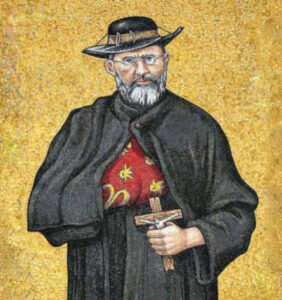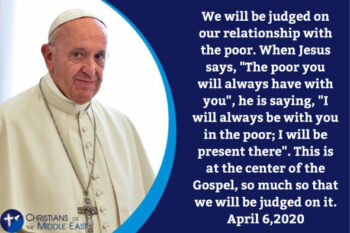World Day of the Poor – 14 November
Extracts from the Pope’s Message given in Rome at Saint John Lateran, 13 June 2021
“The poor you will always have with you” (Mark 14:7). Jesus spoke these words at a meal in Bethany, in the home of a certain Simon, known as the leper, a few days before Passover. As the Evangelist recounts, a woman came in with an alabaster flask full of precious ointment and poured it over Jesus’ head. This caused great amazement and gave rise to two different interpretations.
The first was indignation on the part of some of those present, including the disciples, who, considering the value of the ointment – about 300 denarii, equivalent to the annual salary of a labourer – thought it should have been sold and the proceeds given to the poor.
 In St John’s Gospel, Judas takes this position: “Why was this ointment not sold for three hundred denarii and given to the poor?” St John goes on to note that Judas “said this not because he cared about the poor, but because he was a thief, and as he had the money box, he used to take what was put in it” (12:5-6). It was no accident that this harsh criticism came from the mouth of the traitor. It shows those who do not respect the poor betray Jesus’ teaching and cannot be his disciples.
In St John’s Gospel, Judas takes this position: “Why was this ointment not sold for three hundred denarii and given to the poor?” St John goes on to note that Judas “said this not because he cared about the poor, but because he was a thief, and as he had the money box, he used to take what was put in it” (12:5-6). It was no accident that this harsh criticism came from the mouth of the traitor. It shows those who do not respect the poor betray Jesus’ teaching and cannot be his disciples.
The second interpretation was that of Jesus, and it makes us appreciate the profound meaning of the woman’s act. He says, “Let her alone. Why do you trouble her? She has done a beautiful thing to me” (Mark 14:6). Jesus knows that his death is approaching, and he sees in her act an anticipation of the anointing of his lifeless body prior to its placement in the tomb.
This was beyond anything the others present could imagine. Jesus was reminding them that he is the first of the poor, the poorest of the poor, because he represents all of them. It was also for the sake of the poor, the lonely, the marginalised and the victims of discrimination, that the Son of God accepted the woman’s gesture. With a woman’s sensitivity, she alone understood what the Lord was thinking. That nameless woman, meant perhaps to represent all those women who down the centuries would be silenced and suffer violence, thus became the first of those women who were significantly present at the supreme moments of Christ’s life: his crucifixion, death, burial and resurrection. Women, so often discriminated against and excluded from positions of responsibility, are seen in the Gospels to play a leading role in the history of revelation. Jesus’ then goes on to associate that woman with the great mission of evangelisation: “Amen, I say to you, wherever the Gospel is proclaimed to the whole world, what she has done will be told in memory of her” (Mark 14:9).
This powerful ‘empathy’ established between Jesus and the woman, and his own interpretation of her anointing as opposed to the scandalised view of Judas and others, can lead to a fruitful reflection on the inseparable link between Jesus, the poor and the proclamation of the Gospel.
Jesus not only sides with the poor; he also shares their lot. This is a powerful lesson for his disciples in every age. This is the meaning of his observation that “the poor you will always have with you.” The poor will always be with us, yet that should not make us indifferent, but summon us instead to a mutual sharing of life that does not allow proxies. The poor are not people ‘outside’ our communities, but brothers and sisters whose sufferings we should share, in an effort to alleviate their difficulties and marginalisation, restore their lost dignity and ensure their necessary social inclusion.

Mosaic of St. Damien of Molokai in the Trinity Dome, Basilica of the National Shrine of the Immaculate Conception in Washington DC.
CNS File Photo
Many are the examples of saints who made mutual sharing with the poor their life project. I think, among others, of Father Damien de Veuster, the saintly apostle to the lepers. With great generosity, he answered the call to go to the island of Molokai, which had become a ghetto accessible only to lepers, to live and die with them. He rolled up his sleeves and did everything he could to improve the lives of those who were poor, ill and outcast. He became both doctor and nurse, heedless of the risks involved, and brought the light of love to that ‘colony of death,’ as the island was then called. He himself contracted leprosy, which became the sign of his total sharing in the lot of the brothers and sisters for whom he had given his life. His testimony is most timely in our own days, marked by the coronavirus pandemic. The grace of God is surely at work in the hearts of all those who, without fanfare, spend themselves for the poorest, sharing with them in concrete ways.
Some countries are suffering extremely severe consequences from the pandemic, so that the most vulnerable of their people lack basic necessities. The long lines in front of soup kitchens are a tangible sign of this deterioration. There is a clear need to find the most suitable means of combatting the virus at the global level without promoting partisan interests. It is especially urgent to offer concrete responses to those who are unemployed, whose numbers include many fathers, mothers, and young people. Social solidarity and the generosity which many, thanks be to God, have shown are, together with far-sighted projects of human promotion, making a most important contribution at this juncture.
 We do well to recall the words of Saint John Chrysostom: “Those who are generous should not ask for an account of the poor’s conduct, but only improve their condition of poverty and satisfy their need. The poor have only one plea: their poverty and the condition of need in which they find themselves. Do not ask anything else of them. But even if they are the most wicked persons in the world, if they lack the necessary nourishment, let us free them from hunger. ... The merciful are like a harbour for those in need. The harbour welcomes and frees from danger all those who are shipwrecked, whether they are evildoers, good persons, or whatever they may be, the harbour shelters them within its inlet. You, too, therefore, when you see on land a man or a woman who has suffered the shipwreck of poverty, do not judge, do not ask for an account of their conduct, but deliver them from their misfortune” (Discourses on the Poor Man Lazarus, II, 5).
We do well to recall the words of Saint John Chrysostom: “Those who are generous should not ask for an account of the poor’s conduct, but only improve their condition of poverty and satisfy their need. The poor have only one plea: their poverty and the condition of need in which they find themselves. Do not ask anything else of them. But even if they are the most wicked persons in the world, if they lack the necessary nourishment, let us free them from hunger. ... The merciful are like a harbour for those in need. The harbour welcomes and frees from danger all those who are shipwrecked, whether they are evildoers, good persons, or whatever they may be, the harbour shelters them within its inlet. You, too, therefore, when you see on land a man or a woman who has suffered the shipwreck of poverty, do not judge, do not ask for an account of their conduct, but deliver them from their misfortune” (Discourses on the Poor Man Lazarus, II, 5).
 Entries(RSS)
Entries(RSS)